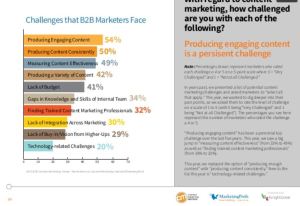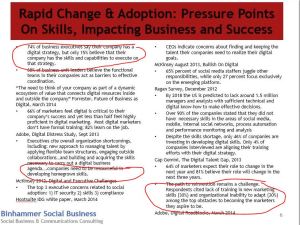Businesses wanting to take advantage of social media may not be ready to seize the opportunity. McKinsey reports that social media adds up to $1.3 trillion opportunity for the economy. At the same time, Capgemini notes that “Ninety percent of all jobs in the next year will require information and communication technology skills, yet more than half the companies polled lacked social media skills.
Marketing Profs’ “2015 B2B Content Marketing Benchmarks, Budget and Trends” report that the persistent challenge is to produce engaging content, followed by additional budget requirements and “gaps in knowledge and skills for internal teams/finding trained content marketers.”
One could postulate that is putting the horse before the cart, so to speak. Not sure how any business can really expect to be generating effective content if it does not have the skilled professionals on the team to do so?
And what teams in business are we looking to? The Capgemni report says across the board, social and digital skills become important. The Marketing Profs report notes that for B2B Content marketing, accountability can rest with Product Marketers, Demand Gen Marketing, PR/Corporate Communications, Social Team or other departments –almost in equal percentages. Across a business social and digital skills become increasingly important.
It’s not just about content marketing. Look at any of the reports and the skill sets required go beyond simple “social” training, employee advocacy or content marketing. They include just a few things, such as:
- Integration of social into marketing, communications, customer care, product development;
- It includes smart project managers who know how to use which social media for what purpose to achieve what benefit;
- integrating social in an effective and purposeful way with business events;
- Social video and visual skills are among the nitty gritty of key social skills, as is transmedia storytelling for example;
- Community management both on your site or elsewhere…where are your customer communities? Is the community manager equipped with the knowledge and expertise to buy social media ads where needed?
- Strategic and effective blogging on your home website, rather than always renting space from Twitter, Facebook or even LinkedIn. What is a strategic approach to blogging on your site? Or is it just a content repository for anything and everything else you use in content marketing?
- Benchmarking and standardization around measurement and KPIs in the use of social is critical from a business management and project management perspective…that too begs different questions about skills training for employees, at different levels of an organization;
- Does the HR or central social team have the ability to put policies in place;
- Who and how determines where to engage with customers (or not) – that’s a social skill that can touch Communications, Marketing, “Customer-Facing” departments…or all departments depending on how your business looks at it.
- Who in the organization really understands the strategic challenges and opportunities of different social networks;
- how to build programs and how employees use those program efforts to actually engage with new influencers in a direct way (rather than simply push out messages through well placed and successful media placement efforts—paid owned and earned).
( By the way, my colleagues, Mark Dollins and Shel Holtz and I have more than 30+ predefined social and digital skills for effective and social programs. Each one of those skills is also defined and then we have enumerated what would be a base/intermediate/strategic level of skill performance…that is a lot of skill definition/grading where the heavy lifting is ready to be put to work and operationalized for you)
This story is not new. Look at the number of studies before the ones cited here. Here is a slide from a presentation…Ive used it here before too. There are lots of studies about the skills challenge. Check the circled highlights.
Of course, on the job training is effective for skills building. But here is a thought: doesn’t it make sense to understand what skills you think you want to have or need to have in order to realize success for your business. Then, check with your team(s) and measure what you have in terms of the skills on hand. Now you can compare what you need to what you have and you can truly commit to professional and skills development for the team and for better business.
One company that seems to have taken upgrading and building employee digital and social skills, beyond simply a social media 101 training effort, seems to be Nestle. What is intriguing about their program, from an outside perspective anyway, is that Nestle brings in staff to their HQ in Switzerland from all over the world for eight months of training and development as part of Nestlé’s Digital Acceleration Team. The participants are exposed to all kinds of data about Nestlé and its brands, such as social commentary about its’ top global brands, where in the world the commentary is coming from, as well as data that draws comparative pictures with Nestle competitors. They also track customer-service inquiries for the company. Here we have individuals from across a global business being given skills not in a single silo ( ie content production) but in a wholistically perspective that draws together a range of social skills, such as:
- social listening
- engagement
- analytics
- digital-content production
- They do case studies or special projects for brands and departments around the world and learn where to invest and take risks
As AdAge reported: “While DAT in its early days was highly focused on social listening and engagement, it has evolved into a program focused more on leadership, Mr. Blackshaw said, “I don’t want this to be seen as a digital program,” he said. “It’s really about leadership and cultivating change agents.” While it is leadership, this is also a real sign of a commitment to professional development and skills development – with a tremendous and huge leadership upside as icing on the cake.
Whether it is simply helping current employees upgrade a few skills or a more wholistic program like Nestle has, by looking at the talent and skills you have today and the ones you need tomorrow, you can get ahead of the game. That is how something like Social Media Excellence X Expertise can put you and your business on track for success, rather than in a position that Fast Company recently noted: “It’s No wonder the gap is poised to create a war for talent that quietly rivals the battle playing out amid the startups of Silicon Valley.”
Perhaps it is time to get ahead of the war for talent? What are you doing to build your teams skills and commit to people being your number one resource?

